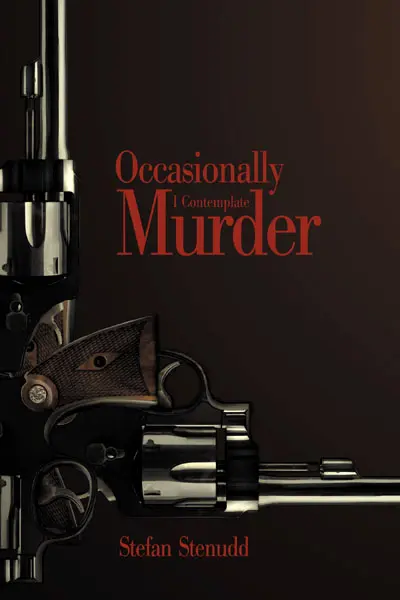 Occasionally I Contemplate Murder 12The complete book onlineI heard that in the city of Gothenburg, at the southwest of Sweden, there is one method of voluntary passing on, which is incomparably the most popular. Gothenburg is a town of industry and shipping, not altogether unlike such places as Detroit of the USA and Liverpool in England. This is the favorite type suicide of its male inhabitants:
He attaches one end of the hose to the exhaust-pipe and leads the other into a side window of the car. Then he relaxes on the driver's seat, the auto motor running, reads the paper and slowly suffocates.
Will the kind of Jesus appreciate the suicidal's consideration towards his posterity? Let's hope so.
It's absolute. There we stand, all of us remaining, and can do nothing. Nothing but pray the very liturgy of the helpless. Pray for the departed one's happy arrival to the beyond, and pray for the rest of us to come to peace with the loss. It's not only the kind of Jesus who accuses the suicidal. Posterity does, too.
How could you! In whatever appearance, we do regard death as a crime, don't we?
It's an obvious oddity, when the penalty is executed on a convicted murderer. To kill the murderer, thereby punishing the criminal by repeating his crime, can that be really justified? And is such a death at all a penalty?
Before the kind of Jesus, he will certainly be accused for his taking of a life, but must he not be shown some mercy, because he was in his turn robbed of his life? Maybe that evens up his heavenly accounts. I'm sure that is in no way the intention of our judicial system.
Does he exclude this organized form of taking of lives from his category of no-no's?
There's a number of professions involved in the execution, participating more or less directly in it. I guess that the kind of Jesus doesn't slap only the hand that turned on the electricity, or pulled the trigger, or released the blade. Or does he?
Are we?
Perhaps, in such a view, there's only one guilty, only one utterly responsible: The executioner.
High authorities may decree this and that, the most impressive congregation of noblemen and sages may reach a most convincing verdict without someone to perform the punishment, nothing will happen. Without the executioner there can be no execution, unless every condemned is as noble as ancient time Socrates, voluntarily emptying the cup of poison whether or not he agrees with the judgement.
Yet, their chosen method of departure was making a mess that could be meant as some criticism of the system. Watch me die, and think of it! Society can afford many such mild rebellions.
Without the acting force of the executioner, the death penalty is no penalty at all. No judge would be satisfied to pass the sentence of: "Death... please!"
If he's not to argue for the court's wisdom being of a divine nature, and therefore of divine rights then his sole defense is one, by which many questionable deeds have been and will be executed: "I was only doing my job."
He did his job, all right but did he have to? There are other jobs. Even if there are not, he would, in the eyes of the divine, do better to starve. By that, he'd deserve pie in the sky when he died. Is he not prepared to suffer the tough earthly consequences then he must prepare for the consequences in the beyond.
I do doubt it. I mean would the Gods create a world where it is necessary to break their prime rule? Anyway, let's say, for the sake of argument, that this is the case. Then the executioner becomes a voluntary banned in the beyond, and therefore, by this formidable sacrifice, a veritable saint on earth. Hero among the living, and foe ever after. Did he make a good bargain?
So much easier, is it not, to let oneself suffer every possible malice on earth, for what little time it lasts, when confident of praise in the eternity waiting up there.
Must not the kind of Jesus find compassion for him, who knowingly deals himself the worst of hands?
It surely takes a God to dare it, when considering the whole complexity of the situation. If divinity, though, is any guarantee of the sentence being just that remains to be seen. Maybe the kind of Jesus avoids judgement on almost all felonies, not because of compassion, but from a sense of incompetence.
Continuing...STARTHow to get the bookIf you want to buy the book, you can do so at most Internet bookstores. Click the image below to see the book at Amazon (paid link). It is also a Kindle ebook and an Audiobook. The link takes you to your local Amazon store (or to Amazon.com).
 
Facebook Page of Occasionally I Contemplate MurderClick the header to visit the book's Facebook page.
My BooksAll my booksOm the Omnipotent science fictionEver Young vampire novelSunday Brunch with the World Maker fictionAll's End science fictionOccasionally I Contemplate Murder essayMy Swedish writingOnlineWaves short storiesPoemsVideo recitalsFabulous fiction by other writersAbout CookiesMy Other WebsitesCREATION MYTHSMyths in general and myths of creation in particular.
TAOISMThe wisdom of Taoism and the Tao Te Ching, its ancient source.
LIFE ENERGYAn encyclopedia of life energy concepts around the world.
QI ENERGY EXERCISESQi (also spelled chi or ki) explained, with exercises to increase it.
I CHINGThe ancient Chinese system of divination and free online reading.
TAROTTarot card meanings in divination and a free online spread.
ASTROLOGYThe complete horoscope chart and how to read it.
MY AMAZON PAGE
MY YOUTUBE AIKIDO
MY YOUTUBE ART
MY FACEBOOK
MY INSTAGRAM
STENUDD PÅ SVENSKA
|
